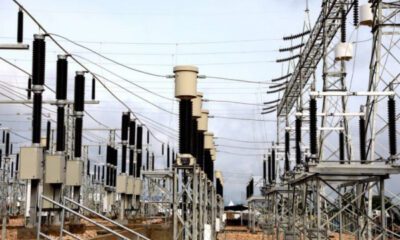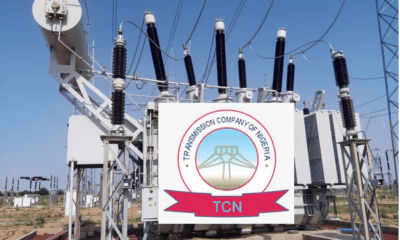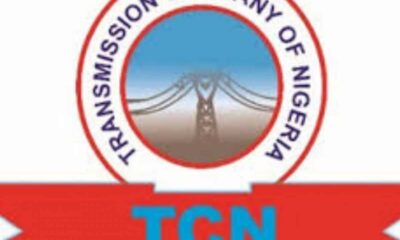Energy
60% of metered customers by-passing meters — TCN

The Transmission Company of Nigeria (TCN) has decried that over 60 percent of metered customers in the country are by-passing their meters.
The General Manager of Regulation and Compliance at the Transmission Company of Nigeria (TCN), Ali Bukar Ahmad made this known on Thursday at the National Institute of Physics webinar Series 2.0.
Speaking, the TCN GM noted that out of an estimated population of 230 million, only 13,112,134 Nigerians are officially registered to use electricity.
He pointed out that among the total of over 13 million customers, 44.23 percent have been provided with meters, and from the entire Nigerian population estimated at 230 million, merely 2.52 percent are metered.
He observed that 60 percent of customers with meters are bypassing them, which adds to the country’s energy poverty issues.
Further explaining the data, he highlighted the nation’s lack of energy resources and its energy insecurity.
According to him, energy security means having a consistent and affordable supply of energy, while energy poverty refers to the absence of a sufficient, quality, and uninterrupted energy supply, along with its associated services and products.
“For a country to be truly independent politically and economically in the 21st century, is to have energy sovereignty and energy independence, and for the sovereignty and independence to be secured at all times and to be backed by the relevant geopolitics.
“In Nigeria, we have four types of energy poverty; the unserved, the underserved, the poor quality of supply and the served.
“Energy security in turn is the bedrock for sustainable development and the attainment of it should leave no one, no citizen behind,” he said.
Ahmad also pointed out that Nigeria’s energy vulnerability stems from several issues, including an over-reliance on gas, insufficient production capacity, and the unreliability and high cost of gas supply.
He noted that the signs of energy vulnerability include deteriorating and ineffective infrastructure, a lack of clear and accountable energy services, vandalism, and a shortage of political and financial resources to tackle these problems.
He said the way forward to ensure energy security in the country was to overcome all policy, regulatory, technical shortcomings and bottlenecks.
Ahmad called for commencement of immediate utilisation of all energy sources in all parts of the country, and for more electricity exports and imports corridors in the country to be opened.
Energy
Shell signs agreement to build gas pipelines in Oyo State


Shell Nigeria Gas, SNG, and the Oyo State Government have signed an agreement to develop a gas supply and distribution infrastructure that will deliver gas to industrial and commercial users in the state.
A statement released on Friday by Shell Nigeria’s Media Relations Manager, Abimbola Essien-Nelson, disclosed that SNG will build and operate the gas distribution network, which will serve customers across Oyo State for 20 years.
According to the statement, the project will start with the construction of gas distribution infrastructure along a 15km pipeline route, adding that it will grow to deliver up to 60 million standard cubic feet of gas per day across the state.
Speaking at the signing ceremony, the Oyo State Governor Seyi Makinde, described the project as a catalyst for development in the state.
The Managing Director of SNG, Ralph Gbobo, noted that the agreement was “a significant milestone for SNG and Oyo State to boost economic activities in Nigeria by supplying industries and manufacturers with natural gas, a more reliable, cost-efficient and environmentally friendly source of energy.”.
He explained that the project would boost Oyo State’s internal revenue and create Job opportunities for indigenes.“
“The Managing Director of The Shell Petroleum Development Company of Nigeria Limited and Chairman, Shell Companies in Nigeria, Osagie Okunbor, remarked that the event pointed to the value of partnership as “Shell continues to power progress” in Nigeria through more and cleaner energy solutions for commercial and industrial customers.
Energy
Nigeria ripe for nuclear power to boost electricity generation – NAEC


The Nigeria Atomic Energy Commission (NAEC) in collaboration with Centre for Energy Research and Training (CERT), Ahmadu Bello University (ABU), Zaria would deploy nuclear science and technology to strengthen electric power generation in Nigeria.
Prof. Yusuf-Aminu Ahmed, Chairman NAEC disclosed this during the 20th Anniversary Symposium of the Nigeria’s first Nuclear Research Reactor-1 (NNR-1) in Zaria on Thursday.
Ahmed said the experience developed over the years on nuclear power at the centre makes Nigeria ripe and ready to go into the next level of power generation through the nuclear reactor.
“We have used the reactor for research and development over the years and now we are going to use the reactor for the purpose of generating electricity.
“President Bola Tinubu has already given the commission a mandate to see how it contributes in the clean energy sphere of Nigeria and the nuclear energy programme of Nigeria would participate,’’ Ahmed said.
He explained that the time for the project would not be open for the public; however, Ahmed added that international partners and vendors were working closely with the commission over the project.
He also said that intergovernmental agreements were signed with some of the vendors on the nuclear power in Nigeria and very soon President Tinubu would make an announcement on the issue.
Earlier, Sen. George Akume, Secretary to the Government of the Federation said the 20 years of safe operation of the nuclear research reactor was an indication that Nigeria has joined the campaign for safe application of nuclear energy.
Akume, represented by his Special Assistant on Technical Issues, Prof. Bolaji Babatunde, added that since the centre had safely operated the nuclear research reactor for 20 years, it can also obtain a nuclear reactor for electricity generation.
According to him, the process of having a reactor that would generate electricity is similar to operating a nuclear research reactor.
“President Tinubu has re-echoed the need for having nuclear energy into the sources of electric power generation in Nigeria and Nigerians should look forward to this power.
“Electricity generated through nuclear energy is clean and safe except for human errors or natural causes such as the one that happened in Hiroshima,’’ he said.
Earlier, Prof. Sunday Jonah, Director of the center said the event was to celebrate 20 years of safe operation, maintenance and utilisation of the first Nuclear Research Reactor code named NNR-1.
However, in spite of the numerous gains at the centre over the years, the Director lamented over a plot by NAEC to wrestle the centre from the university through the proposed NAEC Bill 2022.
He explained that such a move would negate the dreams of the founding fathers that established the centre in universities because of the culture of research and development being promoted at designated universities.
Energy
Alake unveils gender strategy for mining, steel sector


The Minister of Solid Minerals Development, Dr Dele Alake, has unveiled a document for Women in Mining in Nigeria (WIMIN) strategy document.
Speaking at the event, he described the strategy as a significant mile stone in the sector.
He said that the move was a demonstration of the commitment of the Ministry of Solid Minerals Development (MSMD)‘ and Ministry of Steel Development in fostering diversity.
He said that the strategy is aimed at promoting gender equality and women‘s empowerment, adding that its focused on driving productivity for the nations‘ sustainable development.
“It also focuses on improving the opportunities for women to benefit from both sectors sustainably in policy, regulatory, operational, and commercial (large scale, medium scale, small scale, and artisanal levels), and value and supply chain roles.
“This strategy is not just a document but a call to action and a blueprint for all stakeholders to create a more inclusive and gender-balanced mining and steel sector.
“It provides a guideline and framework to guide both ministries, their agencies, and stakeholders to integrate gender equality and women’s empowerment priorities in their policies, programmes, and initiatives,” he said.
He acknowledged the indispensable contributions of women to the success and sustainability of the mining sector, saying that their talents, expertise, and perspectives are critical to the success and growth of the industry.
According to him, Nigeria is not immune from the biases perpetuated against women in these two sectors.
In addressing the situation, he said that the Federal Government has prioritised gender equity and female participation in its “Roadmap for the Growth and Development of the Nigerian Mining Industry.”
He said as part of the efforts of MSMD and Ministry of Steel Development to implement the roadmap, the Mineral Sector Support for Economic Diversification (MinDiver) engaged a consultancy to develop the gender strategy.
He said that to achieve the objectives of the strategy, its institutional capacity would be strengthened for effective gender mainstreaming.
He added that that women’s participation in leadership and governance roles within the mining sector and communities would be increased.
“Promoting women’s economic empowerment and rights and eliminating all barriers (structural and systemic) that hinder women’s meaningful participation, access and control over mining resources and benefits,” he said.
The Minister added that they were committed to building partnerships across a wide range of stakeholders in achieving the vision of the strategy.
He said that the WIMIN strategy was firmly rooted in the principles of equality, diversity, and empowerment, and a call to action for stakeholders mobilisation toward a more inclusive and gender-balanced industry.
Earlier in her remarks, the National President of WIMIN, Dr Janet Adeyemi, described the launch of the strategy as an opportunity to galvanise support and implement actions to address the entrenched gender disparities within the mining and steel sectors.
Represented by the National Secretary, Mrs Emily Ofodile, she said that women within these industries continue to encounter multifaceted barriers that hinder their full participation and advancement.
On her part, the Permanent Secretary of MSMD, Dr Mary Ogbe, urged, women to be change agents at all levels, and urged all organisations to have gender focal persons to help in coordinating all related matters.
-
capital market2 years ago
Rt.briscoe, FBNH, Others halts negative performance of stock market
-
Finance3 months ago
Court orders Sen. Victor Umeh to repay N136m bank debt to AMCON
-



 Abuja Update2 months ago
Abuja Update2 months agoUNDP, FG partnership needed to achieve inclusion, equity- Minister
-
Abuja Update1 month ago
Banks drive stock market performance with N147bn gain
-



 Business1 week ago
Business1 week agoTingo Group unveils Tingo Electric, Tingo Cola drink at Lagos launch
-



 Health2 weeks ago
Health2 weeks agoCapacity training will reduce migration of health workers- NPHCDA
-
News4 months ago
Oil thieves sponsoring malicious media campaign against Navy – Spokesman
-



 Infotech1 month ago
Infotech1 month agoWorld Backup Day: NITDA urges Nigerians to ensure backup of data












